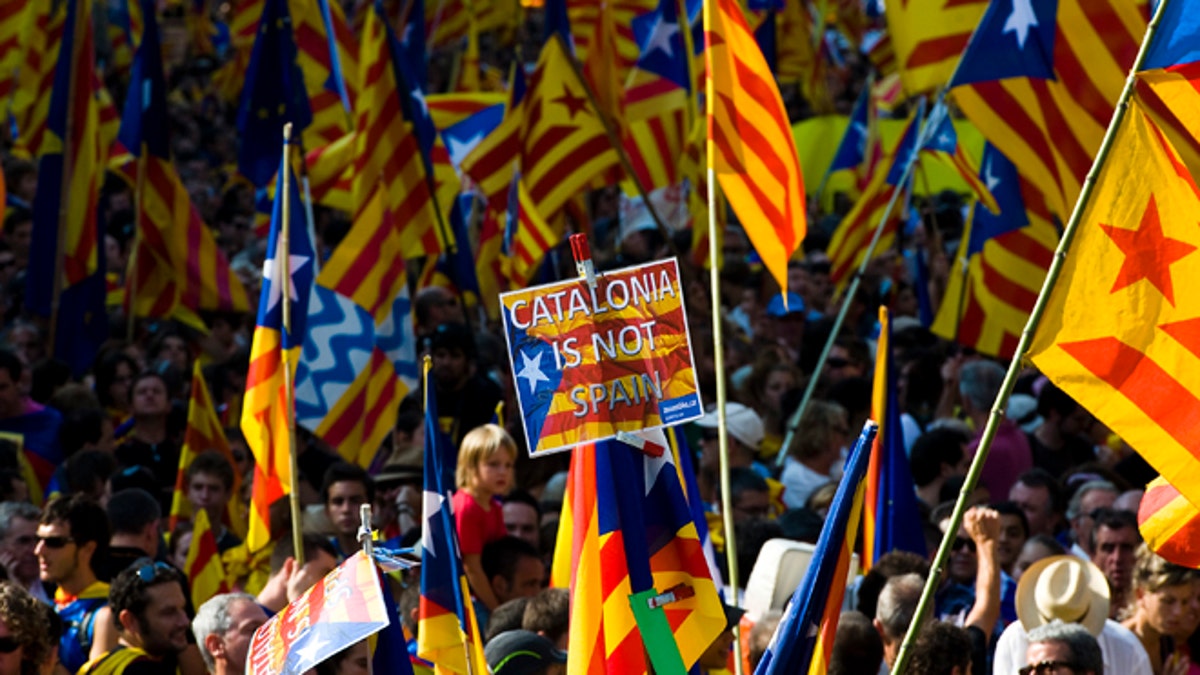
BARCELONA, SPAIN - SEPTEMBER 11: People hold Pro-independence Catalan flags in a demonstration calling for independence during the Catalonia's National Day on September 11, 2012 in Barcelona, Spain. Thousands of Catalans took to the streets of Barcelona demanding a split from Spain and control of their own economy under the slogan 'Catalonia: New European State' on Catalonia's National Day. The Diada Nacional is held every September 11 to remember the defeat of the Catalan troops in 1714. (Photo by David Ramos/Getty Images) (2012 Getty Images)
Since 2008, Spain has been one of the poster children for Europe’s financial crisis as it grapples with a massive debt, an unemployment rate hovering around 26 percent, a downgrading from financial services across the globe and now a strong separatist movement from the country’s influential Catalonia region.
Angered over what many in the region say are policies implemented by the Spanish government that cripple Catalan autonomy and put them at a disadvantage thanks to heavy tax policies, separatist politician Arturo Mas and others in favor of independence have staged huge protests in the Catalan capital of Barcelona and are now plan a November referendum to vote on succeeding from Spain.
Despite speculation by many economists and financial service groups that an independent Catalonia is not going happen, the movement has caused worry not only within the borders of Spain but throughout the European Union with countries like Germany and France concerned about these new regions wanting to join the international body and what the economic repercussions.
Germany, which has already given the ailing Greek government two financial bailouts and is currently mulling over a third, is strongly opposed to any moves that could lead to more economic upheaval in the EU. As the political and economic powerhouse of Europe, the government of German Chancellor Angela Merkel does not want to become the EU’s main lender, which could put the country itself in a dicey economic situation, experts said.
“Germany is flatly opposed to more states in the European Union because they will have to foot the bill if there are more bailouts,” Mauro Guillén, a political economist the University of Pennsylvania’s Wharton School told Fox News Latino.
Lawmakers in Madrid have also voiced their adamant opposition to Catalonia’s independence push, which Spanish Foreign Minister José Manuel García-Margallo called “illegal” and a “clear parallel” with the current situation in the Crimea. Unlike the Scottish independence referendum that has the tacit support of British Prime Minister David Cameron, the Catalans push is deemed as a defiance of the Spanish constitution.
"The self-rule vote in Catalonia isn't possible because it violates article 1.2 of the Spanish Constitution which states the right to decide (on independence) is a matter for everyone in Spain and not just a part of the Spanish population," García-Margallo said on Monday. "Every square centimeter of Spain belongs to all Spaniards...and no political leader can deprive a citizen of Catalonia of the right to be Catalan, Spanish and European."
Spain is generally seen as a country comprised of various, separate regions that each have their own distinct culture and traditions. While its history is filled with independence movements, most famously in the northern Basque Country that saw widespread separatist violence, Catalonia’s move has both a cultural and finical twist in an economically fragile Europe.
With a $275 billion economy roughly the size of Portugal’s, 16 percent of Spain’s overall population and the home of some of the Iberian peninsula’s biggest industries – everything from banking to textiles to car manufacturing – Catalonia has long been one of the main drivers of Spain’s economy. But heavy taxation meant to spread the wealth to less prosperous regions of Spain has not only drawn the ire of some lawmakers in Barcelona but also put the region in so much debt that it asked Madrid for a $6.47 billion emergency loan back in 2012.
While the numbers of those who support independence from Spain falls somewhere between 30 and 60 percent, those Catalans in favor argue that an independent state would free them of Madrid bureaucracy and help them thrive thanks to the ability to branch out their business in other parts of the globe, not just in recession-scarred Spain.
“Basically Catalans want fiscal independence,” said Scheherazade Rehman, a professor at George Washington University’s Elliott School of International Affairs. “That’s the driving force to be independent and be more prosperous.”
Analysts along with lawmakers in Madrid, however, argue that Spain is slowly coming out of the recession and, on top of that, the majority of Catalonia’s business comes from within Spain with financial isolation on the Iberian Peninsula being a very real possibility for an independent Catalonia.
Many observers of the situation in Catalonia argue that the chances of independence are slim, but still see some worrying possibilities ahead for the future of Spain – and Europe – ahead of November’s referendum.
One possibility is the so-called domino effect, where more regions in both Spain and other parts of Europe push for their independence. The Spanish Basque Country is the most obvious example, as its roots go back to the mid-19th century and have at times fueled sectarian violence under the armed nationalist group Euskadi Ta Askatasuna (ETA).
Basque nationalism is particularly worrisome to France, which along with Germany is considered the EU’s main power. The Basque Country, or País Vasco in Spanish, extends into France and the French do not look kindly on giving up that part of the country to a newly independent nation.
Along with the Basques – and the Scots and the Irish Republican movements in Northern Ireland – there are separatist movements in countries throughout Europe including Flemish movements in Belgium, Bavarian groups in Germany and a slew of ones in France. While none of these movements currently have the support or force that the Catalans have, and in some cases the Basques, there are worries from European central governments that Catalan independence could give these groups further incentive — something that EU leaders in Brussels are also opposed to.
“The European Union is happy with its 28 nations,” Guillén said. “They don’t want to have to deal with 31 nations or more and all that implies.”
The threat of violence if the referendum in Catalonia passes and Spain doesn’t recognize the measure is also in the back of the minds of both European lawmakers and analysts, especially as news from Ukraine and Crimea dominate world headlines. When speaking of the situation in Crimea, Spain’s foreign minister called the Crimean split a “flagrant violation of an international constitution” and continuously made references to the Catalan situation during remarks in Brussels earlier this week.
“What is going on in Ukraine should be a stark reminder of what can go wrong,” Guillén said.
Despite these concerns, many economists and financial service groups see a slim possibility of Catalan independence. Reassurances from Catalan policymakers that the independence movement will only proceed along legal means and their want to remain in the euro area have assuaged some concerns in the financial sector.
“Our central scenario assumes that independence will not materialize within the next two to three years,” Moody’s Investors Service noted in a report released earlier this month. “Spain’s and Catalunya’s ratings will continue to be mainly driven by the economic growth outlook, prospects for budgetary consolidation and debt reduction.”
Along with financial predictions, the main driving force behind the failure of Catalan independence is the divide of the region’s powerful business class. While many share the political frustration with Madrid, they also worry about being left in isolation — especially in regards to its membership with the E.U.
What could ultimately decide the fate of Catalan independence is how Spain deals with its economic crisis. If things go well, the Catalans have less of a crutch to lean on, but if the economic situation continues to worsen, the region has more force for an independence push, Rehman said.
“These things serve as a catalyst and move things forward one way or the other,” she added.











































